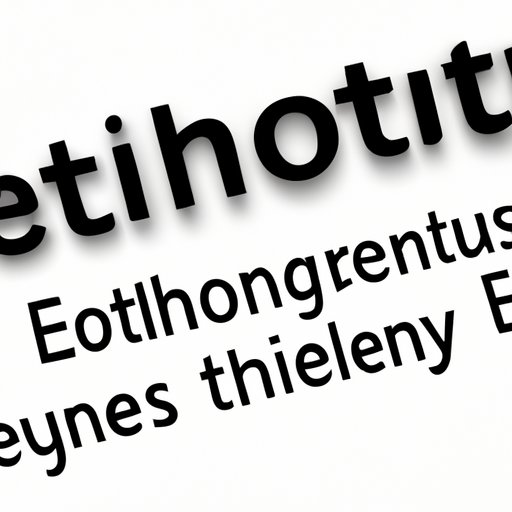Introduction
In persuasive writing, ethos refers to the credibility and trustworthiness of the author or speaker. It is one of the three main components of rhetoric, which also includes pathos (emotional appeals) and logos (logical arguments). In other words, ethos helps readers or listeners decide whether the writer or speaker is someone they can trust and believe in.
When used properly, ethos can be a powerful tool for convincing an audience. It implies that the author or speaker has a degree of expertise on the subject matter, as well as a good reputation. By establishing their credibility, the speaker or writer can more easily persuade the audience.

A Guide to Crafting an Ethical Argument
Establishing Your Credibility with Ethos
The first step in crafting an ethical argument is to establish your credibility. This means demonstrating to the audience that you are knowledgeable and trustworthy. This can be done in a variety of ways, such as citing research and studies, referencing past experiences, or providing evidence from experts in the field.
It is also important to be aware of your own biases and limitations. If you are not an expert in the field, it is important to acknowledge this fact and be honest about what you do and do not know. Additionally, it is important to be respectful of other perspectives and opinions, even if you do not agree with them.
Understanding How to Use Ethos, Pathos, and Logos
Once you have established your credibility, it is important to understand how to use ethos, pathos, and logos effectively in your argument. Ethos should be used to establish trust and credibility, while pathos should be used to evoke emotion in the audience. Logos should be used to make logical arguments and provide evidence to support your claims.
It is important to remember that all three elements should be used together in order to create a persuasive and effective argument. While ethos is important for establishing trust, pathos and logos are necessary for making a strong and convincing argument.
Examples of Ethos in Writing
Examples from Famous Speeches
One of the most famous examples of ethos in writing is Martin Luther King Jr.’s “I Have a Dream” speech. In this speech, he uses his experience as a civil rights leader and his knowledge of the civil rights movement to establish his credibility. He also uses examples from history and references to the Constitution to support his argument.
Another example is John F. Kennedy’s inaugural address. In this speech, he establishes his credibility by referencing his past experiences and accomplishments. He also uses examples from history and rhetoric to make his argument more compelling.
Examples from Everyday Life
Ethos can also be found in everyday writing, such as news articles, blog posts, and opinion pieces. In these types of writing, the author typically establishes their credibility by citing research, referencing past experiences, or providing evidence from experts in the field.
For example, a newspaper article about climate change might include quotes from scientists who specialize in the topic, or a blog post about parenting might include advice from experienced parents. In both cases, the authors are using ethos to establish their credibility and build trust with the reader.

Strategies for Developing Ethos in Writing
Research and Prepare
The best way to establish your credibility is to do your research and prepare before writing. Make sure you have a thorough understanding of the topic and that you are familiar with any relevant research or studies. Additionally, it is important to be aware of your own biases and limitations so that you can be honest with your audience.
Be Authentic
It is important to be authentic in your writing. Instead of trying to sound like an expert, focus on being honest and genuine. This will help to build trust with the reader and make your argument more persuasive.
Be Consistent
It is also important to be consistent in your writing. Make sure that your facts, research, and evidence are accurate and up-to-date. Additionally, make sure that your tone and language are consistent throughout the piece.
Show Respect
Finally, it is important to show respect for other perspectives and opinions, even if you do not agree with them. Demonstrating an open-minded attitude can help you to establish your credibility and build trust with the reader.
Conclusion
In conclusion, ethos is a powerful tool used in persuasive writing. It helps to establish the credibility and trustworthiness of the author or speaker, allowing them to more easily persuade the audience. To effectively use ethos, it is important to do your research and prepare, be authentic, be consistent, and show respect.
By following these tips, you can craft an ethical argument that is both persuasive and convincing. Remember, ethos is only one part of rhetoric, so it is important to use it in conjunction with pathos and logos in order to create a strong and effective argument.
(Note: Is this article not meeting your expectations? Do you have knowledge or insights to share? Unlock new opportunities and expand your reach by joining our authors team. Click Registration to join us and share your expertise with our readers.)
